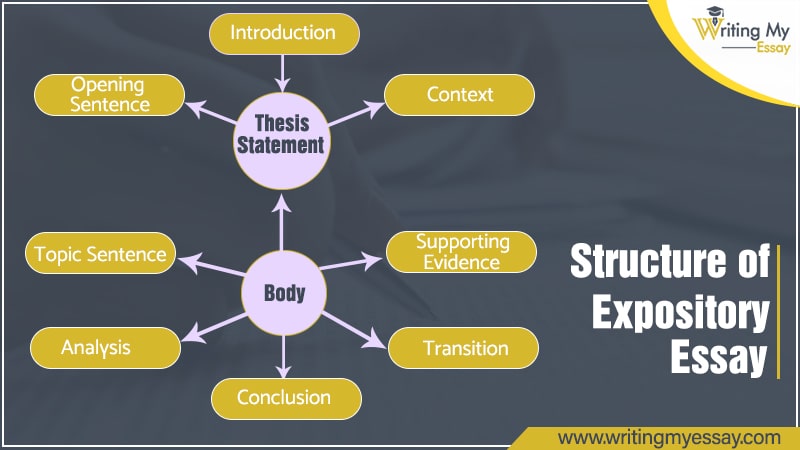Do you often wonder what it takes to write an expository essay? As it is different from writing an extraordinary essay or assignment. Often, students get confused about how to write a well-organized and structured expository essay. Also, if you’re willing to learn about strategies to write a great one, this blog is perhaps your best bet.
Contents
- 1 What is an Expository Essay?
- 2 What Are The Different Types Of Expository Essay?
- 3 Expository Essay Topics
- 4 Expository Essay Outline
- 5 How to Write an Expository Essay?
- 6 The Structure of Expository Essays
- 7 What Are The Benefits Of Expository Writing?
- 8 Point Of View Requirements: Expository Essay Writing
- 9 Expository Essay Examples
- 10 Conclusion
What is an Expository Essay?
Expository, a derivative of the word “exposition,” means to uncover or lay it straight out. An expository essay is a kind of essay that clarifies and explains an idea in a way that readers can interpret. Any writer who writes an expository essay should investigate an idea, evaluate it from every angle and present arguments you believe in.
Expository writing is one of the four main types of writing. The others are persuasive, narrative, and descriptive writing.
And expository writing is something with which we are most familiar. You just need to position facts and observations and let the speakers know—- how to speak for themselves most effectively? This is the kind of writing you do when you analyze the information you’ve been assigned to study, think critically about a critical class, and explain the process and reasons.
Generally, all students are not capable or have the cognitive abilities to draft expository essays. That’s where getting help from experts becomes handy. You can subscribe to Write My Essay to write a persuasive expository essay.
What Are The Different Types Of Expository Essay?
The expository essay can be sub-categorized into various types. Let us throw some light on each one of those.

- Descriptive Essays: Readers are hungry for information. So, the whole idea of writing a descriptive essay is to provide information to readers. This is all about clarifying a concept and defining a term in the most comprehensive manner. It usually involves sharing the details of an experience, emotion, place, or situation to give writers an opportunity to explain.
- Classification Essays: This includes organizing a topic into categories. Usually, examples are used as references to explain the subjects better.
- Cause/ Effect Essays: It comprises an argument that explains the causes of an event on another. The relationship between the two concepts needs to be identified. In this academic writing style, the writer needs to derive the consequences of the interaction between the two ideas.
- Contrast/ Compare Essays: They analyze different topics to explain the differences or similarities. The subject could be anything, such as a place, person, object, etc.
- Process Essays: As the name suggests, a process essay is a step-by-step process, a detailed explanation of any process. It makes the user walk through the steps of completing a task.
It focuses on providing the essential guidance, or instructions. It helps readers attain a goal. A recipe has a lot of commonalities between them. Each body part is a step in the process. Hence, the conclusion explains— what the user will gain by completing the step?
Expository Essay Topics
Here are some expository essay topics that you can choose for your next essay assignment:
- Explain which public figure you admire and why.
- Describe the likely consequences of consuming drugs.
- Explain why some parents are conservative and strict.
- If you had to be a superhero, which one would you be, and why?
- Explain why you like the company of a particular friend.
- Describe the likely consequences of childhood marriage.
- Explain why a teen moving to a different country or city is a bad idea.
- Explain why a teenager getting a driver’s license is a big deal.
- Describe how you help your parents at home.
- Explain how social media is influencing the younger generation.
Expository Essay Outline
Here is the expository essay outline
The introduction includes three parts:
- Hook (It will capture a reader’s attention)
- Thesis Statement (Stating out your opinion and topic loud & clear)
- Detail (Few lines to show how you will cover your main topic)
Body includes:
Paragraph 1: It should include one subtopic under the main topic, along with a supporting explanation. In the last lines, summarize or justify the point you were making.
Paragraph 2: Write in one sentence a sub-topic relevant to the main topic. Repeat the same process as in paragraph one.
Paragraph 3: Cover the last sub-topic in one sentence and follow the same process as in paragraph one.
The conclusion includes the following
- Mentioning the thesis again and justifying it
- Summarizing sub-points and connecting them with the main points.
- Expository essay structure

How to Write an Expository Essay?
There are other things to keep in mind as well, even though you presently know a lot about the expository essay format. In this section, we’re going to move over the precise steps you have to take while identifying a way to write an expository essay. Steps for Writing Expository Essays
1. Gather ideas and structure them
The absolute first element you have to do while given an expository essay task is to cautiously move over the instructions. Make certain you absolutely understand the requirements from you. If it’s for class, you will be confined to certain subjects and word counts. There can be regulations on the quality of sources you could use, and so on. You would possibly write a top-notch essay. However, get a low grade due to you ignoring a few small limits or guidelines.
Once you understand precisely what you’re supposed to do, it is time to consider different principles you would like to provide an explanation for. Make certain you’re aware of the unique styles of expository essays. So for that subject matter, you have a tentative idea of what sort of expository essay could be perfect while you brainstorm topics.
2. Prepare the Outline
It is time to do research once you’ve zeroed in on a topic. One of the excellent methods to devise your writing is to apply an expository essay outline to arrange interesting data. While carrying out research concentrate on the body paragraphs instead of on the introduction or conclusion. Think about 3 principal methods you could provide an explanation for the topic and place information that suits those subtopics under the correct body paragraphs.
Consider potential thesis statements, while carrying out research and filling out an outline. You might limit your research if coming up with a thesis statement too early. So it’s far better to expand a thesis statement as you discover an increasing amount of information. Hence, we can say, you have to have a final thesis statement by the end of the strategy planning stage.
3. Start writing the preliminary draft
Now is the time to translate your outline into complete sentences. To leave the writing of the introduction until the end is frequently beneficial. You may have a better idea of what to mention in an introduction after writing the body paragraphs. You write down your thesis statement however, ensure that. Use the data you’ve found to create a cohesive evaluation of the topic in every body paragraph.
The data you present, make certain that it is on topic and connects to the opposite facts laying around it. Think about what the reason for every body paragraph is and question whether or not the information you’re providing suits that motive or not.
4. Give the draft a final shape
Go over the primary draft of the essay and concentrate on whether or not the different paragraphs make sense or not. Don’t be afraid to reorganize sections or absolutely remove a few pieces of data. As you write your draft, new methods of expressing the information can come to mind so as to make the general essay more powerful. Make certain that you aren’t seeking to make a persuasive argument. Also, ensure that you are using information instead of opinions as evidence.
Go over every sentence to make certain that it’s far clear and that it suits the motive of the paragraph it is in. Look at the information you’ve covered and ensure that it is beneficial and complements your knowledge of the subject. It is better to have much less data than more if the data is distracting or does not add something to the essay.
5. Check for mistakes and edit
Go over the very last draft of your essay and take a look at formatting mistakes, grammatical errors, spelling mistakes, and so forth. Ensure that it complies with all of the pointers of the assignment. Finally, ask a friend or relative to move over the paper to do the closing check. If you experience like you still need to make plenty of adjustments, do not be sad. Spend the extra time to make the adjustments or reach out to an expert service.
The Structure of Expository Essays
Speaking of expository essays, you follow the same structure with every assignment: writing a catchy introduction, supporting body paragraphs, and expanding the points mentioned in the introduction, followed by a conclusion that reiterates your point and underscores your thesis.
In case the instructor doesn’t ask for certain words in some capacity, there is no such thing as what your essay needs to be. Similarly, there is no need for specific paragraphs—but it must express your points accurately in an elaborative manner. To achieve this, your essay must adhere to a certain format, give or take a number of body paragraphs, depending on the supporting points you make.
Introduction
A great start can either make or break the situation. You present your essay topic and your thesis statement. If your introduction is catchy enough, you introduce your supporting evidence so that it captivates your reader and understand your thesis.
Body Paragraph— 1
Paragraphs are like buffers, as in any feast. Every buffer contains a different recipe. Every supporting point you make needs a body paragraph. Ideally, you need a five paragraph essay, which is considered the standard essay length. However, you may stretch further, up to six paragraphs, to communicate your thesis statement.
Body Paragraph —2
You can use transition words and sentences to transit between body paragraphs. Transition words and sentences are phrases that connect your relationships between two paragraphs, signaling to the reader why you’re making a specific point and— how it fits into your overall work?
Body Paragraph- 3
In your last paragraph, you’ll reach your conclusion. But it doesn’t mean you start summarizing here—give your final body paragraph insight and detail like your previous body paragraphs.
Conclusion:
In the conclusion part, you restate the thesis statement and summarize the points made in the body paragraphs. Your conclusion should be neatly tied up and answer lingering questions readers may have.
What Are The Benefits Of Expository Writing?
When a reader seeks any kind of information because they want to learn more about a topic, well-explained written copies are the best way to go.
In expository writing, information is shared in a properly structured format that is easily understandable. Data presented in expository writing holds great value for clarifying the point. It is a more straightforward style of writing, which leaves no room for ambiguity in the reader’s mind. Also, the writers logically use examples and arguments. As a result, such factors make the delivery powerful.
In addition, one of the main advantages of an expository essay is that it requires no motive writing. In this type of writing, the writer doesn’t go the extra mile to persuade the readers. The information shared is usually supported by claims from credible sources. The writer only presents the facts. No opinions are imposed on the readers, so the information shared is unbiased.
Expository essay writing is a great skill for fields such as business, science, journalism, and even professional life.
- Research: Expository writing requires extensive research and evaluation work. Hence, it further enhances your knowledge as a writer and augments your skill set.
- Critical Thinking: This type of writing involves deep critical thinking exercises on the topic, which helps you develop better assessment abilities.
- Clarity In Expression: Presenting all the information collected from different resources in a concise manner.
- Organizational Skills: It trains your mind to structure your ideas, and write them with logic. All the research and outlining work should improve your time-management skills.
Point Of View Requirements: Expository Essay Writing
An expository essay is written from a third-person point of view. Hence, “he, she, it, they” pronouns should be used to describe the objective of writing.
We explain to the reader our topic with the relevant information. The gathered data and facts are used to bring credibility to the subject.
If the writer is sharing a personal experience, then first-person, “I, me,” or second-person, “you,” could be used. So, the usage of POV is dependent entirely on the assignment, and the way you want to present it.
Expository Essay Examples
Example #1: Harry and Draco: Not As Different as They Seem
“I really don’t think they should let the other sort in, do you? They’re just not the same, they’ve never been brought up to know our ways. Some of them have never even heard of Hogwarts until they get the letter, imagine. I think they should keep it in the old wizarding families.” (Rowling 61)
(Ref: https://examples.yourdictionary.com/)
Example #2: Learning to Read (by Malcolm X)
“It was because of the letters that I happened to stumble upon starting to acquire some kind of a homemade education.
I became increasingly frustrated at not being able to express what I wanted to convey in letters that I wrote, especially those to Mr Elijah Muhammad. In the street, I had been the most articulate hustler out there. I had commanded attention when I said something. But now, trying to write simple English, I not only wasn’t articulate, but I also wasn’t even functional. How would I sound writing in slang, the way I would say it, something such as, ‘Look, daddy, let me pull your coat about a cat, Elijah Muhammad — ‘
Many who today hear me somewhere in person, or on television, or those who read something I’ve said, will think I went to school far beyond the eighth grade. This impression is due entirely to my prison studies.”
(Ref: https://literarydevices.net/expository-essay/ )
Conclusion
We hope you now have enriched information when it comes to writing expository essays. It explains a topic in detail by clarifying or exposing things, people, or places. The whole idea is to pass on complete information to the readers in the most interesting way. If you need an essay writing service, then Writing My Essay will always provide you with the desired results.
